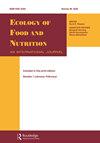避免食物浪费的预测:对计划行为理论和相关信念扩展模型的分析。
IF 1.3
4区 医学
Q4 NUTRITION & DIETETICS
Ecology of Food and Nutrition
Pub Date : 2024-09-01
Epub Date: 2024-07-12
DOI:10.1080/03670244.2024.2377591
引用次数: 0
摘要
本研究采用计划行为理论(TPB)来预测避免食物浪费的意向和行为。在试点研究中,确定了行为信念、规范信念和控制信念。在主要研究中,使用两波设计和 SEM 评估了包含描述性规范和道德规范的 TPB 模型。通过 MIMIC 模型分析了信念与 TPB 构建之间的关联。态度、描述性规范和道德规范以及感知行为控制与避免食物浪费的意向相关,而意向又能预测行为。考虑形成意向过程中最重要的信念对设计预防食物浪费干预措施具有重要意义。本文章由计算机程序翻译,如有差异,请以英文原文为准。
Predicting Food Waste Avoidance: Analysis of an Extended Model of the Theory of Planned Behavior and of Relevant Beliefs.
This research adopted the Theory of Planned Behavior (TPB) to predict intention and behavior to avoid food waste. In a pilot study, behavioral, normative, and control beliefs were identified. In the main study, a TPB model extended with descriptive and moral norms was assessed using a two-wave design and applying SEM. The associations between beliefs and TPB constructs were analyzed by MIMIC models. Attitude, descriptive and moral norms, and perceived behavioral control were associated with intention to avoid food waste, which predicted behavior. Considering the most important beliefs in forming intentions has important implications for designing food waste prevention interventions.
求助全文
通过发布文献求助,成功后即可免费获取论文全文。
去求助
来源期刊
CiteScore
3.50
自引率
0.00%
发文量
23
审稿时长
>12 weeks
期刊介绍:
Ecology of Food and Nutrition is an international journal of food and nutrition in the broadest sense. The journal publishes peer-reviewed articles on all aspects of food and nutrition -- ecological, biological, and cultural. Ecology of Food and Nutrition strives to become a forum for disseminating scholarly information on the holistic and cross-cultural dimensions of the study of food and nutrition. It emphasizes foods and food systems not only in terms of their utilization to satisfy human nutritional needs and health, but also to promote and contest social and cultural identity. The content scope is thus wide -- articles may focus on the relationship between food and nutrition, food taboos and preferences, ecology and political economy of food, the evolution of human nutrition, changes in food habits, food technology and marketing, food and identity, and food sustainability. Additionally, articles focusing on the application of theories and methods to address contemporary food and nutrition problems are encouraged. Questions of the relationship between food/nutrition and culture are as germane to the journal as analyses of the interactions among nutrition and environment, infection and human health.

 求助内容:
求助内容: 应助结果提醒方式:
应助结果提醒方式:


